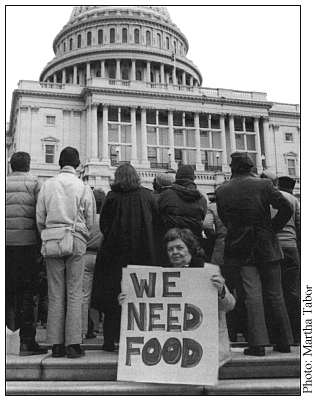Poverty. It's a word that invokes images of dilapidated housing, food stamps, and struggling families. Society used to go about trying to help the impoverished, however, as of recent, there has been a push to criminalize the impoverished and to push them even further to the margins of society.
Just a couple days ago, in Orlando the police arrested "eight activists for violating an ordinance against serving food to groups of 25 people or more in a downtown public park without a permit." [1] (The ordinance can be read here, see Section 18A.09-2.) The activists were part of a group called Food Not Bombs, which has encountered problems with the police before, yet they continue to go out and feed the homeless.
There is no legitimate reason for this law other than to punish the homeless. Due to Orlando laws, parks are one of the few places the homeless can congregate and stay in relative safety. Because of the restrictions placed on people who want to feed the homeless, homeless persons must now find other ways of feeding themselves. They will most likely turn to already crowded food banks and pantries [2], most of which hand out food on a first-come first-serve basis. If they don't make it in time, then they'll be forced to go hungry.
This, however, is not the only example of the criminalization of poverty. Also in Florida, Governor Rick Scott has passed by way of executive order, a bill that requires welfare recipients to be drug-tested as a precondition to them getting state aid. "The idea, plugged by Scott and the GOP-dominated Legislature, is that drug tests will root out welfare recipients who are using public dollars to buy drugs." [3] However, this does nothing but push the stereotypical thinking that if someone is more then they must be spending their money on drugs. What makes this bill worse still is the fact that
Officials estimate the initial screenings would cost about $10 per person – refundable if the individual passes – and first-time failures will be disqualified for one year from receiving benefits under the Temporary Assistance for Needy Families program. A second failure disqualifies the individual for three years. [4]
By disqualifying first and second-time failures, Governor Scott will succeed only in increasing the amount of crime in Florida as drug addicts try to get money for their habits and their stomachs. Also the bill once again frames drug addiction in the form of a criminal problem rather than a health problem.
The criminalization of poverty must end. Being poor is not a crime. By pushing them even further to the fringes of society, we are ignoring our moral duty to aid those who are unable to do so for themselves and in doing so, are eroding our morality.
Please feel free to send comments, concerns, and questions to whataboutpeace@gmail.com. Please use the title of the blog post in the subject line
Please feel free to send comments, concerns, and questions to whataboutpeace@gmail.com. Please use the title of the blog post in the subject line
Endnotes
4: Ibid

No comments:
Post a Comment